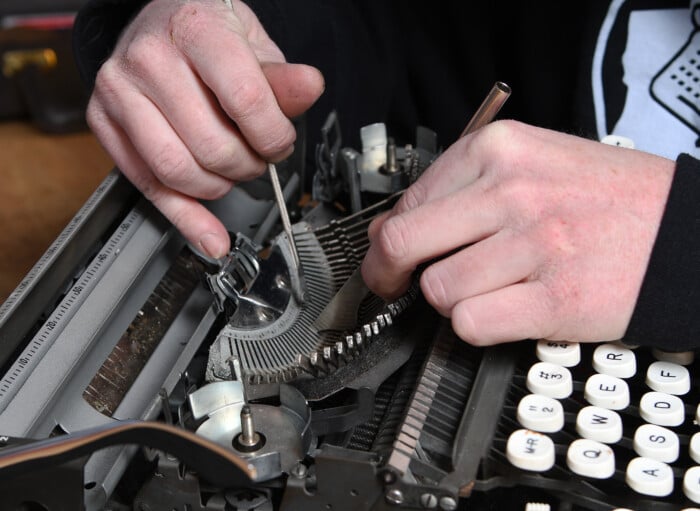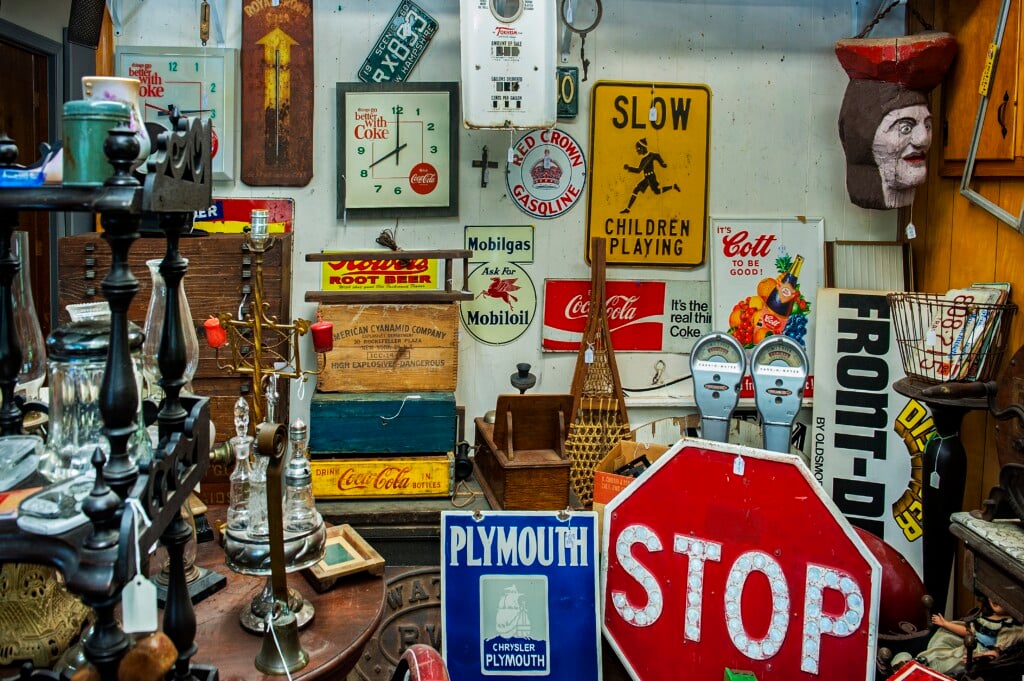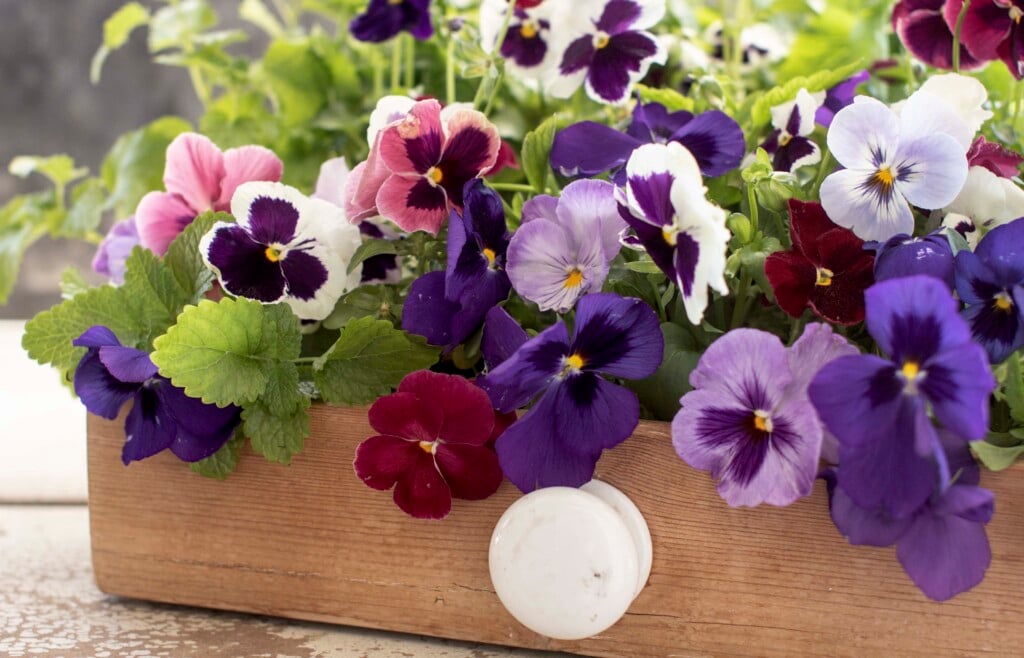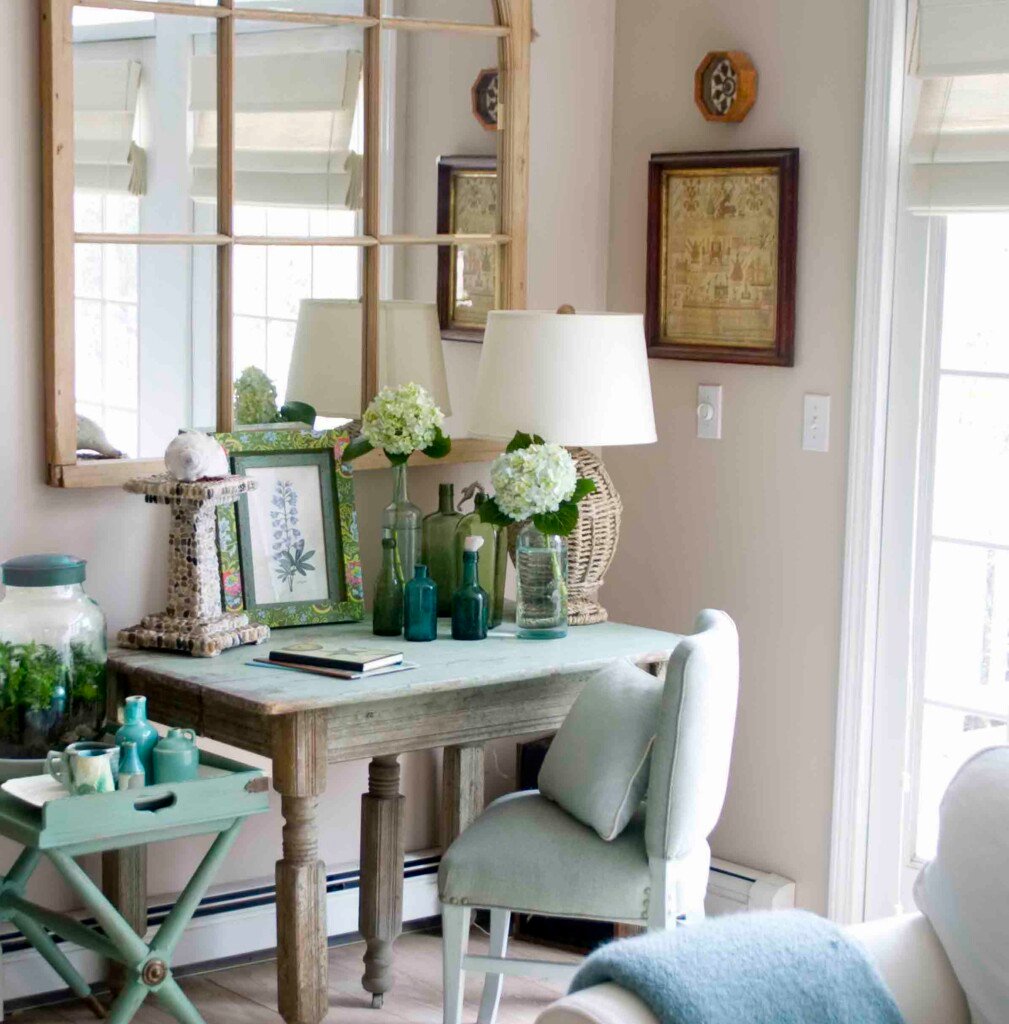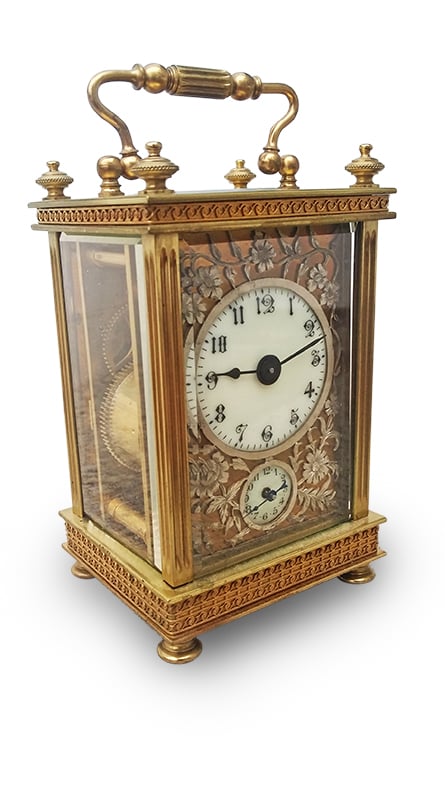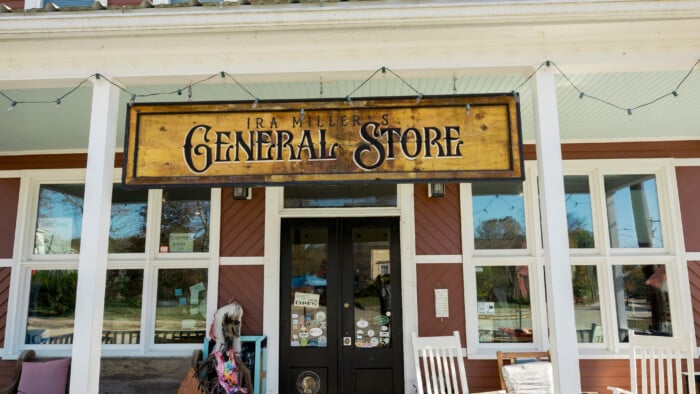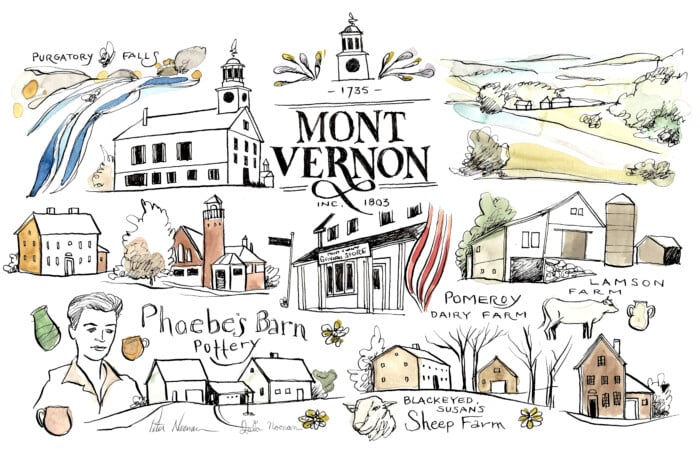The Art of the Thrift
Secondhand and consignment shops in New Hampshire support sustainability, creativity and local communities
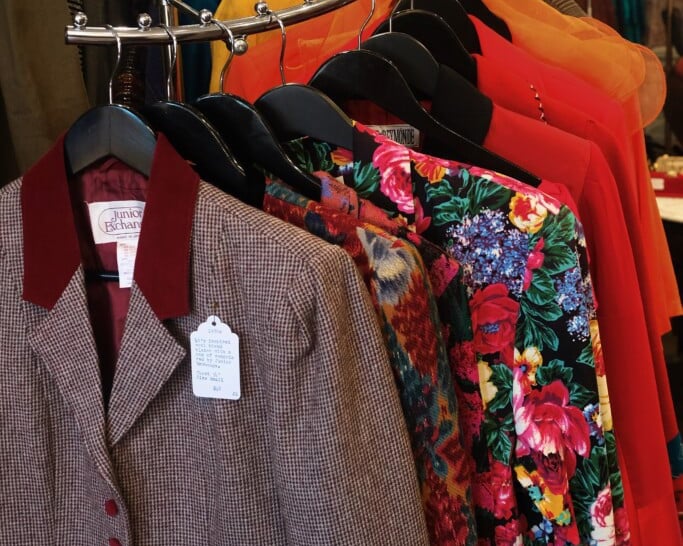
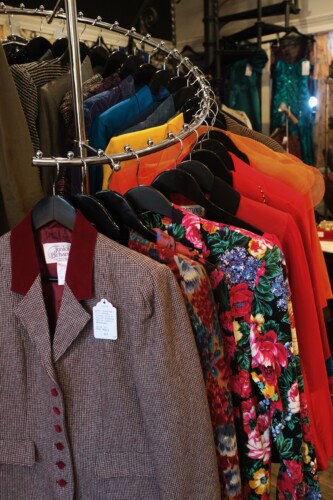
At Cotillion Bureau, a vintage clothing store in Portsmouth, garments are arranged by color, not size.
On the tag, shoppers will find a brief description of the garment along with the decade it was manufactured.
One-click buying options, last-minute trips to Target and clothing subscription boxes. Admittedly, this is how I shop, especially when I’m trying my hardest to avoid crowded stores during the holidays.
Lately, however, I’ve tried to be more conscientious of my consumption practices, and, thanks in large part to the inspiration and guidance from my friend Milena Lopez, a talented thrifter, I’ve become more versed on the benefits — and downright fun — of shopping second-hand.
In mid-September, the sun’s warmth reminding us more of summer than the arrival of cooler days, Milena and I took to the Seacoast for a day of thrifting, a general term for buying used goods at a variety of store types.
Our first stop was Exeter’s Dogwood Dell. Upon entering the newly opened consignment store, the doorway marked by a colorful garland of flowers that popped against the earthy brick exterior, we were met with a number of displays organized by clothing type: women’s blouses, pants, skirts and dresses to the left of the intimate boutique, and racks of children’s apparel and shoes to the right.
“I love thrifting and consignment,” said shop owner Cammie Switzer, donning a flowing blue and white floral print dress, “because I think you can do so much with your personal style this way. You don’t have to look like everyone else.”
“It pushes you,” said Milena, as she flipped through a nearby display, “because when you go to Macy’s, every brand has the same thing in every size. When you go thrifting or to a consignment store, it is what it is.”
“And it’s always changing, right?” she added. “Every day we have people drop things off.” At the time, Switzer was preparing to transition her displays in preparation for fall, swapping out shorts for pants, and adding light jackets and sweaters to the racks.
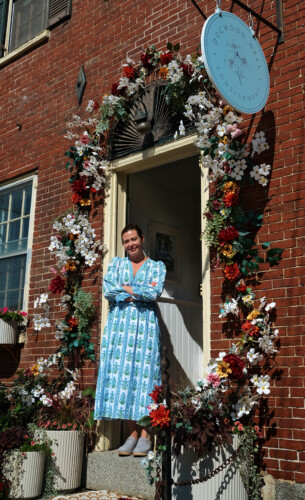
Owner Cammie Switzer stands in the doorway of Exeter’s Dogwood Dell, a consignment store
specializing in women’s and children’s clothing that opened in June.
Although it seemed far off at the time, I asked Switzer to offer suggestions for shopping second-hand in preparation for the holidays.
“When you’re buying for an event, it is one point in time of the entire season,” she said. “Instead of buying one-use, one-time outfits, check out your local consignment store.”
We headed to Portsmouth next, stopping first at Esta, a boutique dedicated solely to “previously loved” women’s merchandise. Inside the consignment store, owned by Vicki Turner, we perused the racks of designer clothing — Armani, Eileen Fisher and Joseph Ribkoff. Handbags, a specialty that brings many customers in, decorated every nook of the store, often paired with a matching heel and silken neckerchief to complete the look.
Milena paused at a velvet jacket with a subtle cheetah print, the neck and cuffs crocheted in a floral pattern. Taking the garment in her hands — a valuable tip I’ve adopted — she felt the fabric and inspected the stitching on the inside. Oversized and unique, it was a statement piece Milena would wear. “I love this,” she said.
As we stopped to ogle the Coach purses fashioned on the shelves of a large yellow credenza, Turner shared an anecdote of a mother-daughter pair who vowed to shop only consignment for the entirety of 2025. (This, I’ve decided, will be my 2026 New Year’s resolution.) When they last visited, late in the summer, they had stuck to their promise.
“We seem to be filling our retail stores with a lot of fast fashion and items that don’t have good quality and are not sustaining,” Turner said. “They’re tearing, they’re falling apart, and so more and more people are embracing this.”
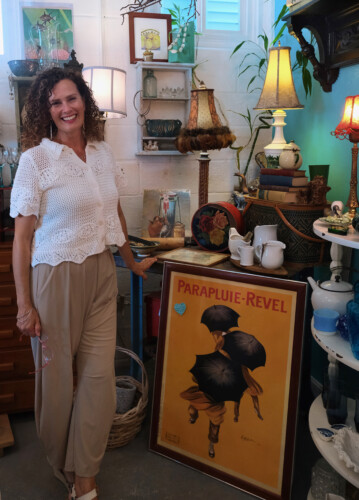
Nest owner Andrea Ardito purchased this original Parisian poster from a local collector who
was stationed in France during WWII. It was one of the first pieces the octogenarian ever collected.
Next door to Esta sits Cotillion Bureau, a vintage store that complements the contemporary fashion of Turner’s boutique. When Milena and I walked in, we were both struck by the display of color. Vibrant blue shirts with geometric patterns, a dress with pop-ping hot pink roses, and blazers in varying orange hues gave the boutique more of an art gallery feel.
Drawn to a corner rack of formal wear, I found myself inspecting a shimmering gold dress with a strapless bodice and a short, bouffant skirt, reminding me of something Cyndi Lauper might have worn in her heyday. I imagined myself donning this one-of-a-kind garment at a New Year’s Eve party.
“Every piece of clothing here has a meaning, and it’s well made,” said Jordan McKenney, the manager of Cotillion Bureau’s sister shop Hello Again in Dover. “A lot of them are timeless pieces, which have a little bit more meaning than some plastic thing from the internet.”
In the past two decades, clothing quality has declined significantly due to the widespread use of cheaper synthetic materials, like polyester, shoddy manufacturing practices and a consumer shift toward trendy, disposable items, what has become known as “fast fashion.”
But this is starting to change, McKenney said. “A lot of people are thinking more carefully about how they use their money and where the things they buy come from.”
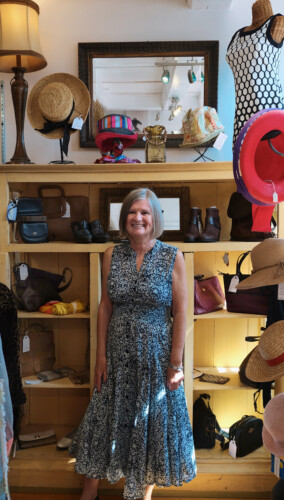
Vicki Turner, who purchased Esta five years ago, poses in front of a display of Coach handbags —a popular item at the moment — and other accessories.
Our final stop that afternoon was the treasure trove that is Nest, a shop in Portsmouth’s west end filled with an assortment of curated vintage and antique products from France, Italy, Canada and New England.
“The very basic message that we all grew up with of ‘reduce, reuse, recycle’ is alive and well in my shop,” said owner Andrea Ardito. “It’s funny because I’ll have people say I’m a green business, and I don’t necessarily make that connection, because I’m just doing it every day, right?
“This is beautiful,” Ardito continued, pointing to a 100-year-old dresser in perfect condition, “but it also is not going to be in a landfill.”
Poring over the items in the store, I think of the thrifted holiday gift I received from Milena last year: a lacquered trinket box containing a pair of earrings. Knowing she chose those objects specifically for me made the gift more meaningful and the impression lasting.
Whether it’s a porcelain teapot, an antique lamp, the shade adorned with feathers, or an acrylic painting of a seaside church with a personalized note inscribed on the back, the finds in Ardito’s store all possess an heirloom quality not found in products at big box stores, evoking memories and connecting us with the past.
“I gravitate towards whatever brings joy when I see it. And I gravitate towards things that have a story,” said Ardito, leading us to a pale blue pie cabinet and retelling the story behind the French antique. The cabinet was made for the original owner’s great-grandmother, a pie maker in the North Country who always placed her homemade pies on specific shelves. Strawberry always on the first shelf, rhubarb always on the second, and so on. Ardito gushed as she shared the details, and it was clear how fulfilling it is for her to pass on these stories, preserving them — along with the item — through time.
In this frantic age of online shopping and fast fashion, I wonder, what are we losing? What are we leaving behind?
Tips for Thrifting
• Learn about fabrics and find out what you like. What makes it a quality garment from the cut, stitching and material? Don’t forget to read the labels, especially before washing.
• Avoid focusing on size. Clothing sizes evolve over time and sizing charts often vary. Oversized items can even look stylish.
• Go prepared. Wear form-fitting clothing when trying on used clothes.
• Set a budget. Cheaper prices tend to lead to impulsive shopping. Limiting your spending means you really have to select carefully. You’ll leave happier knowing that everything you purchased is something you love and need.
• Give yourself time. Look through every item in the store to find the best treasures.
• Inspect items carefully. Check the item’s condition and overall quality. Consider how long the item will last you in the future.
• Finally, have fun. The best way to do that? Go with a friend!
Shops Around NH
Dogwood Dell Consignment
27 Front St., Exeter
603-583-9185 • dogwooddellconsignment.com
Cotillion Bureau
65 Bow St., Portsmouth
603-319-6680 • cotillionbureau.com
Esta
67 Bow St., Portsmouth
603-501-0136 • estaresale.com
The Consignment Gallery
294 S River Road, Bedford
603-668-4114 • consignmentgallery.com
Hilltop Consignment Gallery
56 N. Main St., Concord
603-856-0110 • hilltopconsignment.com
Ladders Thrift Shop
16 Main St., Plymouth
603-238-9016 • Facebook
Nest
100 South Albany St., Portsmouth
603-502-3654 • nestportsmouthnh.shop
Outfitters Thrift Store
394 Second St., Manchester
603-641-6691 • fitnh.org
